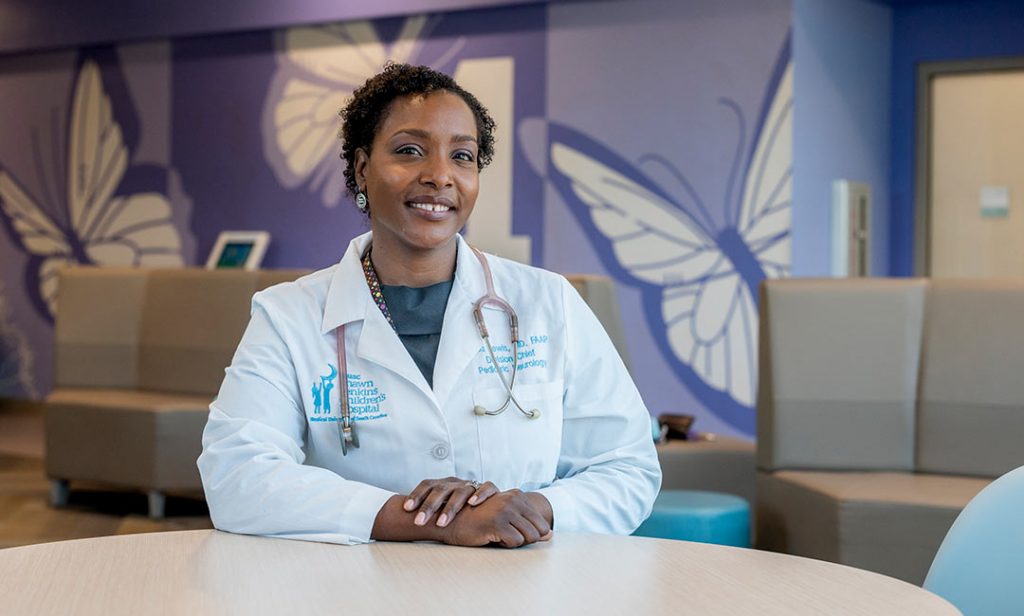
Dr. Dalila Lewis finds the brain and all that it controls — from what we do to the decisions we make and the many things that can ultimately go wrong — fascinating. Her first introduction to the body and medicine was with her mother, a clinical psychologist. As a child, she once accompanied her mother to biology class and “helped” dissect both a pig and a cow eye. Dr. Lewis describes this experience with pure elation even all these years later.
In high school, while volunteering in the emergency department, she shadowed a few physicians, including a neurosurgeon. This exposure solidified her desire to learn all she could about the complexities of the central nervous system.
While drawn to pediatrics because of the brightness and resilience of children, she never thought it would be her first love. Dr. Lewis was intrigued with the brain’s developmental process from prenatal age and the many changes that occur so quickly. During her pediatric and obstetrics rotations, she was mesmerized with the infants she saw during their routine visits. Laughing, Dr. Lewis confessed that she considers herself a big kid at times, which lends a helping hand in gaining children’s trust.
This connection deepened once she became a parent herself. She experienced firsthand the fear that comes with worrying about the health of your child. Both of her daughters, now 9 and 13, were born prematurely. Her oldest spent three months in the NICU as she continued her child neurology fellowship. “Living on the other side of medicine as a parent of a patient with medical needs is a humbling experience,” she softly admitted. Those three months grounded her ability to develop empathy and showed her just how frightening the unknown can be when it involves your own child, an experience that makes her feel a special bond when counseling parents.
Dr. Lewis joined the Medical University staff in August 2020. The hospital wanted new leadership to provide stability and enhance growth in this division from a staff, faculty and patient care perspective. She was excited to remain in the collaborative environment of an academic setting with potential for clinical and professional growth.
As a sub-specialist in pediatric epilepsy, the pediatric population in the Charleston area and surrounding counties could benefit from her expertise. According to Dr. Lewis, this particular population is huge and considered underserved. “In Charleston, there is a definite need to reach children to ensure they are receiving complex epileptic care as well as treatment for other neurological conditions,” she remarked. Giving back and making a difference is extremely important to her.
Continuity and access to care need to improve. Turnover with the pediatric division has resulted in families not being able to see physicians on a regular basis. This can lead to a scenario where medications and assessments change, and neurological evaluation care is not assessed in a timely manner. Dr. Lewis strives to create a platform where patients can expect regularly scheduled appointments. She aspires to grow the pediatric epilepsy program and strengthen the partnership between pediatric neurosurgery and the neurosciences to evaluate children with complex epilepsy syndrome.
While initially unaware that she would be the first African American woman to hold the title of Division Chief, she was not surprised. She felt drawn to accept the position by the leadership she met. Her Department Chair, Dr. Andrew M. Atz, a pediatric cardiologist, “is a very supportive and facilitative individual and sees the value of obtaining multiple points of view and input,” she said. This department recently created a Diversity & Inclusion Group and one of the persons she interviewed with was the Chair of that group: Dr. Mileka Gilbert, M.D., Ph.D., a pediatric rheumatologist.
“I found her to be wonderful. After speaking with her, then meeting other people of color — African American faculty members in leadership positions — I felt there was a community here that I could join and grow with. The fact that this was something championed by the department chair let me know that this is a supportive department to join. Every place is not like that,” she explained. “I have been to many locations and experienced different kinds of methodology and cultures pertaining to approaches to inclusion, and I was really struck with how genuine and thoughtful the MUSC approach was and the feeling among the people of color and the African American faculty that I met. I felt voices were being heard, and support was there to champion efforts to improve awareness from a professional perspective, as well as improve the cultural literacy within the patient population. To me, this was very important. “
Before ending the interview, I couldn’t help but ask Dr. Lewis about those rumored college years in New Orleans and her days in the jazz band. She gave me another infectious laugh and told me it was true: she loves to sing! By her senior year, she had time for electives. She tried pottery for a while, then indulged her interest in singing and joined the jazz band. She used to sing in the Gospel Choir at her local church in Maryland, so I made sure to invite her to join me in the MUSC Gospel Choir when we reconvene for our campus concerts at St. Luke’s Chapel. She made me promise to let her know when we start rehearsing again, and I plan to do just that.